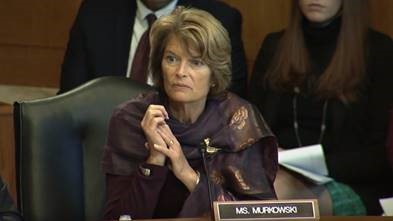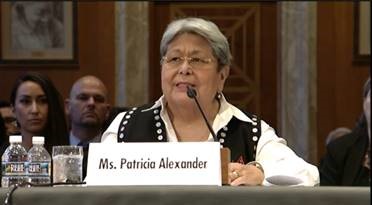Murkowski Joins Committee in Addressing Missing and Murdered American Indian and Alaska Native Epidemic
‘Confronting the Silent Crisis in Indian Country’
U.S. Senator Lisa Murkowski (R-AK) and her colleagues on the Senate Indian Affairs Committee held an oversight hearing focused on missing and murdered indigenous people. During the hearing, the committee received testimony from two panels of witnesses, including Alaskan Patricia Alexander, representing Central Council of the Tlingit and Haida Indian Tribes of Alaska. The hearing highlighted the extent of the epidemic of missing and murdered American Indians and Alaska Natives and also shed light on what can be done at the federal level to help facilitate better data collection and ensure timely and thorough investigations.
During the hearing Senator Murkowski discussed some of the challenges faced in rural Alaska in regards to law enforcement and emergency response.
(Click the image above for video.)
“In Alaska we have what is called a VPSO or Village Public Safety Officer who are often the first and only responder in a community. The harsh reality we face in Alaska is that we have numerous rural communities that are hundreds of miles away from the nearest community with a VPSO or member of law enforcement,” said Senator Murkowski. “And you compound that with the fact that many of these communities don’t have 911 service. In the event that you do, if you are to call 911 or local law enforcement, you’re likely to get an answering machine, if you get anything at all. So, these are some things that we take for granted back here in a city and in our larger communities. But that is not the reality of far too many in the state that I represent.”
During Patricia Alexander’s testimony, she spoke about the extent of the epidemic of missing and murdered indigenous women, particularly in Alaska.
(Click the image above for video.)
“While violence against Native women occurs at higher rates than any other ethnic group in the United States, it is at its worst in Alaska. A full 50 percent of Alaska Native women will have experienced physical or sexual violence in their lifetime. I am one,” said Patricia Alexander. “Tlingit and Haida is all too familiar with the corrosive effect that this violence has on our community and culture and way of life. It has been more than a year since the unsolved death of 19-year-old Jade Williams of Kake. Nearly a year since the unsolved death of 37-year-old Francile Turpin of Klawock. And two and a half years since the murder of 28-year-old Judylee Guthrie, also of Klawock. The future of Indian Country depends on whether all of us work to ensure that Native women live in environments that are free of such rampant, unaccountable violence.”
Background:
- November 14, Senator Murkowski introduced a report prepared by the Seattle-based Urban Indian Health Institute on Missing and Murdered Indigenous Women and Girls (MMIWG.) The report indicates that the epidemic of violence against MMIWG, initially believed to be confined to Indian Country, is far more reaching with 75 new cases in 2018, alone. Alaska was the fourth highest state in the nation in terms of number of cases.
- December 6, the Senate passed S. 1942, the Savanna’s Act, sponsored by Senator Heidi Heitkamp (D-ND) and cosponsored by Senator Murkowski, sending it to the House for consideration. The bill combats the epidemic of MMIWG by improving the federal government’s response to addressing the crisis.










